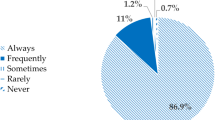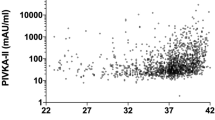Abstract
Hemorrhagic disease of the newborn, more aptly termed “Vitamin K Deficiency Bleeding (VKDB),” has long been recognized as a cause of significant morbidity and mortality in early infancy. A single intramuscular dose of vitamin K administered at birth has virtually eliminated VKDB, and this prophylactic regimen has been recommended by the American Academy of Pediatrics since 1961. Although most newborns in the United States receive vitamin K at birth, a growing number of parents are hesitant about this intervention, citing concerns about harm from the injection, preservatives contained in the medication, and clashes with personal belief systems. Ultimately, there is distrust in the medical establishment as many of these parents also opt out of newborn ophthalmic prophylaxis and importantly, childhood vaccinations, establishing a dangerous public health precedent that will lead to resurgence of vaccine-preventable diseases. Various shared decision making models and educational efforts can assist newborn health care professionals in addressing these parental concerns so that VKDB can be effectively prevented in all newborns.
This is a preview of subscription content, access via your institution
Access options
Subscribe to this journal
Receive 12 print issues and online access
$259.00 per year
only $21.58 per issue
Buy this article
- Purchase on Springer Link
- Instant access to full article PDF
Prices may be subject to local taxes which are calculated during checkout
Similar content being viewed by others
References
Townsend C. The haemorrhagic disease of the newborn. Arch Pediatr. 1894;11:559–65.
Dam H. Hæmorrhages in chicks reared on artificial diets: a new deficiency disease. Nature. 1934;133:909–10.
Volpe JJ. Intracranial hemorrhage in early infancy–renewed importance of vitamin K deficiency. Pediatr Neurol. 2014;50:545–6.
Shearer MJ. Vitamin K deficiency bleeding (VKDB) in early infancy. Blood Rev. 2009;23:49–59.
Sankar MJ, Chandrasekaran A, Kumar P, Thukral A, Agarwal R, Paul VK. Vitamin K prophylaxis for prevention of vitamin K deficiency bleeding: a systematic review. J Perinatol. 2016;36:S29–35.
McPherson C. Vitamin K deficiency bleeding: an ounce of prevention. Neonatal Netw. 2020;39:356–62.
Harrington DJ, Clarke P, Card DJ, Mitchell SJ, Shearer MJ. Urinary excretion of vitamin K metabolites in term and preterm infants: relationship to vitamin K status and prophylaxis. Pediatr Res. 2010;68:508–12.
Newborn AAoPCoFa. Controversies concerning vitamin K and the newborn. American Academy of Pediatrics Committee on Fetus and Newborn. Pediatrics. 2003;112:191–2.
Report of committee on nutrition. Pediatrics. 1961;28:501.
Loyal J, Shapiro ED. Refusal of intramuscular vitamin K by parents of newborns: a review. Hosp Pediatr. 2020;10:286–94.
Miller H, Kerruish N, Broadbent RS, Barker D, Wheeler BJ. Why do parents decline newborn intramuscular vitamin K prophylaxis? J Med Ethics. 2016;42:643–8.
Golding J, Paterson M, Kinlen LJ. Factors associated with childhood cancer in a national cohort study. Br J Cancer. 1990;62:304–8.
Golding J, Greenwood R, Birmingham K, Mott M. Childhood cancer, intramuscular vitamin K, and pethidine given during labour. BMJ (Clin Res ed). 1992;305:341–6.
Draper GJ, Stiller CA. Intramuscular vitamin K and childhood cancer. BMJ (Clin Res ed). 1992;305:709–11.
Ross JA, Davies SM. Vitamin K prophylaxis and childhood cancer. Med Pediatr Oncol. 2000;34:434–7.
American Academy of Pediatrics. Vitamin K Ad Hoc Task Force: Controversies concerning vitamin K and the newborn. Pediatrics 1993;91:1001–3.
Loyal J, Weiss TR, Cheng JH, Kair LR, Colson E. Refusal of vitamin K by parents of newborns: a qualitative study. Acad Pediatr. 2019;19:793–800.
Asteriadou-Samartzis E, Leikin S. The relation of vitamin K to hyperbilirubinemia. Pediatrics. 1958;21:397.
Hall RW, Anand KJS. Pain management in newborns. Clin Perinatol. 2014;41:895–24.
Hamrick HJ, Gable EK, Freeman EH, Dunn LL, Zimmerman SP, Rusin MM, et al. Reasons for refusal of newborn vitamin K prophylaxis: implications for management and education. Hosp Pediatr. 2016;6:15–21.
Loyal J, Taylor JA, Phillipi CA, Goyal NK, Dhepyasuwan N, Shapiro ED, et al. Refusal of vitamin K by parents of newborns: a survey of the better outcomes through research for newborns network. Acad Pediatr. 2017;17:368–73.
Notes from the field: late vitamin K deficiency bleeding in infants whose parents declined vitamin K prophylaxis–Tennessee, 2013. MMWR Morb Mortal Wkly Rep. 2013;62:901–2.
Dekker R. Evidence On: The vitamin K shot in newborns https://evidencebasedbirth.com/evidence-for-the-vitamin-k-shot-in-newborns/2019 [Available from: https://evidencebasedbirth.com/evidence-for-the-vitamin-k-shot-in-newborns/.
Frequently Asked Questions (FAQ’s): Vitamin K and the Vitamin K Shot Given at Birth 2021 [Available from: https://www.cdc.gov/ncbddd/vitamink/faqs.html.
Vitamin K Deficiency Bleeding 2021 [Available from: https://www.cdc.gov/ncbddd/vitamink/index.html.
Where We Stand: Administration of Vitamin K 2019 [Available from: https://www.healthychildren.org/English/ages-stages/prenatal/delivery-beyond/Pages/Where-WeStand-Administration-of-Vitamin-K.aspx.
Shah SI, Brumberg HL, La Gamma EF. Applying lessons from vaccination hesitancy to address birth dose Vitamin K refusal: Where has the trust gone? Semin Perinatol. 2020;44:151242.
Gowda C, Dempsey AF. The rise (and fall?) of parental vaccine hesitancy. Hum Vaccin Immunother. 2013;9:1755–62.
Moses BD, Borecky AD, Dubov A. It is OK to nudge for vitamin K. Acta Paediatr. 2019;108:1938–41.
Opel DJ, Omer SB. Measles, mandates, and making vaccination the default option. JAMA Pediatr. 2015;169:303–4.
Section 405.21—Perinatal services 2019 [Available from: https://regs.health.ny.gov/content/section-40521-perinatal-services.
333-021-0800Administration of Vitamin K to Newborns 2018 [Available from: https://secure.sos.state.or.us/oard/viewSingleRule.action?ruleVrsnRsn=239124.
An Act To Prevent Vitamin K Deficiency Bleeding and Eye Damage in Infants 2020 [Available from: https://www.mainelegislature.org/legis/bills/bills_129th/chapters/PUBLIC426.asp.
Lantos JD, Jackson MA, Opel DJ, Marcuse EK, Myers AL, Connelly BL. Controversies in vaccine mandates. Curr Probl Pediatr Adolesc Health Care. 2010;40:38–58.
Largent EA, Persad G, Sangenito S, Glickman A, Boyle C, Emanuel EJ. US public attitudes toward COVID-19 vaccine mandates. JAMA Netw Open. 2020;3:e2033324.
Cheng JH, Loyal J, Wood KE, Kair LR. Oral vitamin K prophylaxis in newborns: a survey of clinician opinions and practices. Hosp Pediatr. 2020;10:153–8.
Hand I, Noble L, Abrams SA. Vitamin K and the newborn infant. Pediatrics. 2022;149:1–6.
Author information
Authors and Affiliations
Contributions
TPR, conceptualized and designed the perspective manuscript, wrote the initial draft and subsequently revised the manuscript. OF conceptualized and designed the perspective manuscript, and reviewed and revised the manuscript. PJS conceptualized and designed the perspective manuscript, and reviewed and revised the manuscript. All authors approved the final manuscript as submitted and agree to be accountable for all aspects of the work.
Corresponding author
Ethics declarations
Competing interests
The authors declare no competing interests.
Additional information
Publisher’s note Springer Nature remains neutral with regard to jurisdictional claims in published maps and institutional affiliations.
Rights and permissions
Springer Nature or its licensor (e.g. a society or other partner) holds exclusive rights to this article under a publishing agreement with the author(s) or other rightsholder(s); author self-archiving of the accepted manuscript version of this article is solely governed by the terms of such publishing agreement and applicable law.
About this article
Cite this article
Rogers, T.P., Fathi, O. & Sánchez, P.J. Neonatologists and vitamin K hesitancy. J Perinatol 43, 1067–1071 (2023). https://doi.org/10.1038/s41372-023-01611-w
Received:
Revised:
Accepted:
Published:
Issue Date:
DOI: https://doi.org/10.1038/s41372-023-01611-w



